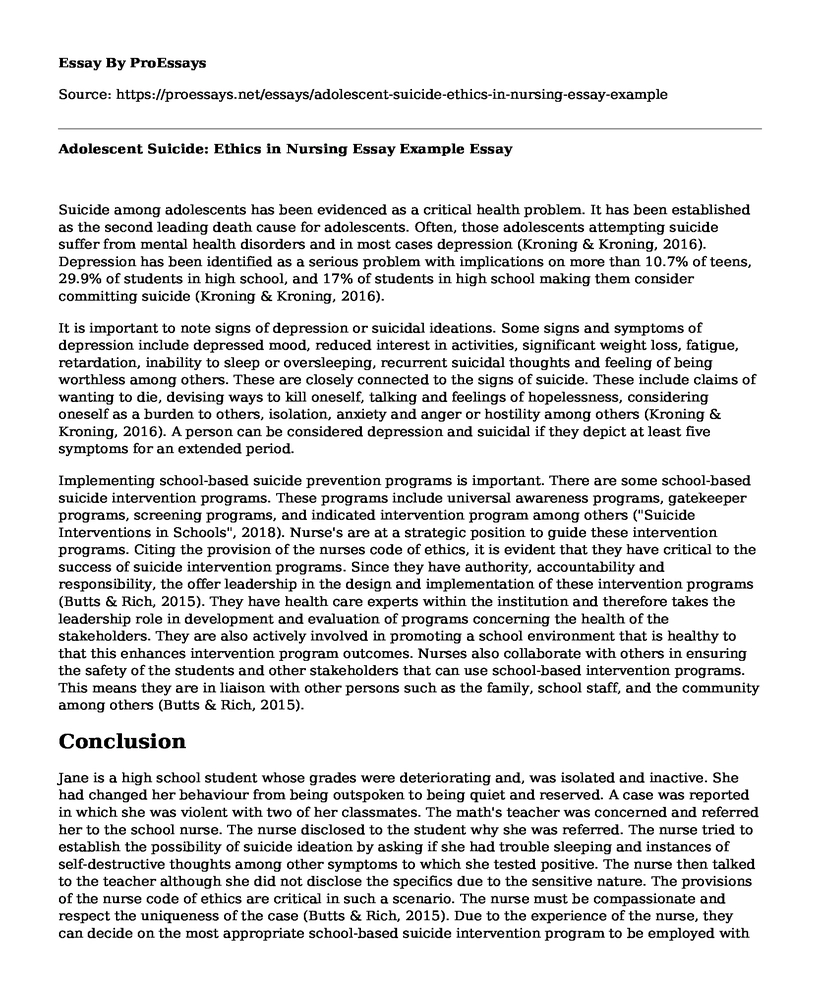Suicide among adolescents has been evidenced as a critical health problem. It has been established as the second leading death cause for adolescents. Often, those adolescents attempting suicide suffer from mental health disorders and in most cases depression (Kroning & Kroning, 2016). Depression has been identified as a serious problem with implications on more than 10.7% of teens, 29.9% of students in high school, and 17% of students in high school making them consider committing suicide (Kroning & Kroning, 2016).
It is important to note signs of depression or suicidal ideations. Some signs and symptoms of depression include depressed mood, reduced interest in activities, significant weight loss, fatigue, retardation, inability to sleep or oversleeping, recurrent suicidal thoughts and feeling of being worthless among others. These are closely connected to the signs of suicide. These include claims of wanting to die, devising ways to kill oneself, talking and feelings of hopelessness, considering oneself as a burden to others, isolation, anxiety and anger or hostility among others (Kroning & Kroning, 2016). A person can be considered depression and suicidal if they depict at least five symptoms for an extended period.
Implementing school-based suicide prevention programs is important. There are some school-based suicide intervention programs. These programs include universal awareness programs, gatekeeper programs, screening programs, and indicated intervention program among others ("Suicide Interventions in Schools", 2018). Nurse's are at a strategic position to guide these intervention programs. Citing the provision of the nurses code of ethics, it is evident that they have critical to the success of suicide intervention programs. Since they have authority, accountability and responsibility, the offer leadership in the design and implementation of these intervention programs (Butts & Rich, 2015). They have health care experts within the institution and therefore takes the leadership role in development and evaluation of programs concerning the health of the stakeholders. They are also actively involved in promoting a school environment that is healthy to that this enhances intervention program outcomes. Nurses also collaborate with others in ensuring the safety of the students and other stakeholders that can use school-based intervention programs. This means they are in liaison with other persons such as the family, school staff, and the community among others (Butts & Rich, 2015).
Conclusion
Jane is a high school student whose grades were deteriorating and, was isolated and inactive. She had changed her behaviour from being outspoken to being quiet and reserved. A case was reported in which she was violent with two of her classmates. The math's teacher was concerned and referred her to the school nurse. The nurse disclosed to the student why she was referred. The nurse tried to establish the possibility of suicide ideation by asking if she had trouble sleeping and instances of self-destructive thoughts among other symptoms to which she tested positive. The nurse then talked to the teacher although she did not disclose the specifics due to the sensitive nature. The provisions of the nurse code of ethics are critical in such a scenario. The nurse must be compassionate and respect the uniqueness of the case (Butts & Rich, 2015). Due to the experience of the nurse, they can decide on the most appropriate school-based suicide intervention program to be employed with utmost respect for the patient's rights, health and safety (Butts & Rich, 2015). The nurse also needs to collaborate with other stakeholders such as teaching staff and family members of the patient.
References
Butts, J., & Rich, K. (2015). Nursing ethics (4th ed.). Massachusetts: Jones and Bartlett Publishers.
Kroning, M., & Kroning, K. (2016). Teen Depression and Suicide. Journal of Christian Nursing, 33(2), 78-86. doi: 10.1097/cnj.0000000000000254
Suicide Interventions in School. (2018). Retrieved from https://headspace.org.au/assets/School-Support/Suicide-intervention-in-schools.pdf,./.;ll
Cite this page
Adolescent Suicide: Ethics in Nursing Essay Example. (2022, Aug 23). Retrieved from https://proessays.net/essays/adolescent-suicide-ethics-in-nursing-essay-example
If you are the original author of this essay and no longer wish to have it published on the ProEssays website, please click below to request its removal:
- The Health Effects of Smoking Bans Essay
- How Foods Labeled "Healthy" Can Still Make You Fat
- Paper Example on Health Disparities in the United States
- Assignment Example on Responsive Intervention for a Hispanic Client
- Essay Sample on Cardiac Disorder
- Essay Sample on Classifying Mental Disorders: 2000 Years of Evolution
- Essay Example on Mode of Delivery and Asthma Development: A Global Perspective







